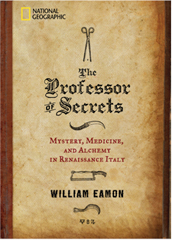“One of the virtues of Eamon’s book is its judicious attitude to these puzzles [of the origins of modern science]. He picks out a crucial feature of knowledge’s place in culture: experts can gain authority of they can convince their society that they have access to esoteric matters only to be reached through their specialized skills and yet of general potential utility. This was the role of the tradition of secrets . . . By the sixteenth and seventeenth century, Eamon explains, older models which supposed that the learned should merely demonstrate the causes of what was already reliably known, were challenged by a powerful image of the hunt for the unknown.”
-Simon Schaffer, The London Review of Books
“Eamon gives a rich and lively account of authors and writings that were always unacademic, unscrupulous, unprofessional, turbulent, and unsettled: that is to say, an account of the popular or seamy side of medicine and natural knowledge in medieval and early modern times. . . . A book of many unusual topics. . . . Eamon is very learned and writes eloquently.”
-A. Rupert Hall, Nature
Eamon convincingly charts the development of the books of secrets tradition, and highlights the debt which experimental science owes to it. He evokes with skill the shady world in which early modern scientists moved, between the marketplace and the court, the printing shop and the alchemists’ forge. . . . Eamon succeeds in reuniting the apparently separate tales of the development of esoteric study and the growth of experimental philosophy in early modern Europe. . . . His synthesis is bold and original.”
-Scott Mandelbrote, The Times Higher Education Supplement
“Eamon’s main point is that books of secrets are the ‘missing links’ between medieval ‘secrets’ and Baconian experiments (the modern scientific experimental method). . . . Eamon . . . provide[s] plenty of material for thought in this multifaceted volume.”
-Charles Burnett, The New York Times Book Review
“Eamon’s book is rich in material and suggestive in its presentation of a world of natural knowledge generally unfamiliar to historians of science.”
-Peter Dear, Social Studies of Science
 SET AGAINST THE SUMPTUOUS BACKDROP
of Renaissance Italy, this riveting tale explores the era’s medicine and culture through the life of the world’s first "celebrity doctor"—whose miracle cures and outsize personality drew both adoration and scorn.
The Professor of Secrets was Leonardo Fioravanti, a brilliant, forward-thinking, and utterly unconventional doctor... His marvelous remedies and talent for self-aggrandizement earned him the adoration of the people, the derision of the medical establishment, and a reputation as one of his era’s most colorful and combative figures.
SET AGAINST THE SUMPTUOUS BACKDROP
of Renaissance Italy, this riveting tale explores the era’s medicine and culture through the life of the world’s first "celebrity doctor"—whose miracle cures and outsize personality drew both adoration and scorn.
The Professor of Secrets was Leonardo Fioravanti, a brilliant, forward-thinking, and utterly unconventional doctor... His marvelous remedies and talent for self-aggrandizement earned him the adoration of the people, the derision of the medical establishment, and a reputation as one of his era’s most colorful and combative figures.






